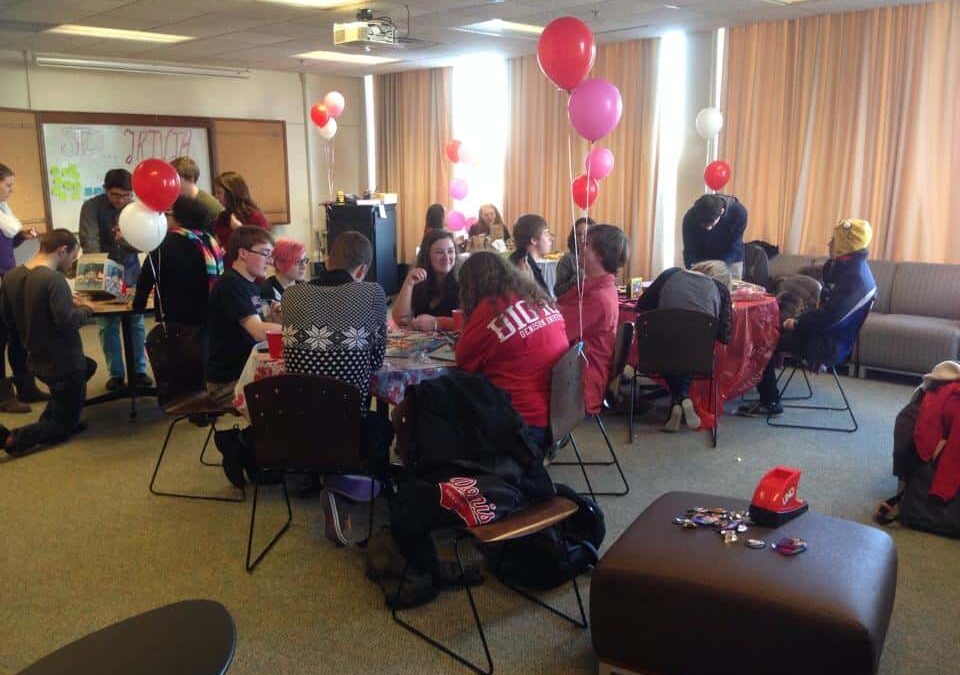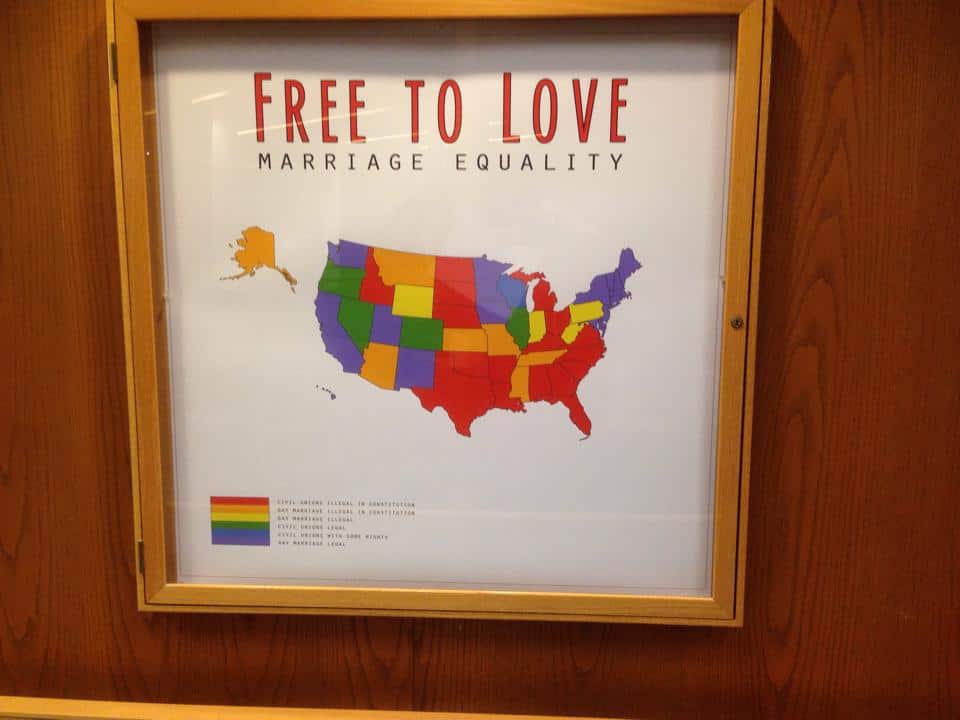Curtis Edmonds
Editor-in-Chief
Amanda Peiffer ‘16 remembers the day at her Richfield, Ohio high school when a teacher ripped down paper cut outs displaying both heterosexual and homosexual couples and threw them in the garbage in front of her class. Peiffer was a dedicated member of her high school’s gay-straight alliance club, and was shocked by her teacher’s reaction to the decorations. “She said, ‘we don’t need this up here,’” said Peiffer. “I couldn’t believe that could happen at a public school.”
Peiffer, a mathematics major, has moved on from the incident and is now president of Denison’s Outlook, an LGBT-focused group on campus. The daughter of Roman Catholic, Republican parents, Peiffer is straight. She says that her passion for Outlook and the LGBT community is because “I’ve watched friends go through [expletive] hell. [The LGBT community] is something people are still really ignorant about.”
Outlook has a full executive board, with a vice president, a social chair, a treasurer, a secretary and two representatives in the student senate. According to Peiffer, meetings usually draw 25-30 students per week.
Meetings take place in a conference room on the fourth floor of the student union each Thursday, and a box of Goldfish – rainbow edition of course – greets the members. Outlook is indeed a family, with students who identify as lesbian, gay, bisexual, transgender and straight.
Six freshmen members are referred to as “the rainbow babies.” Smiling, Peiffer says, “We need to come up with a better name.”
Seeing Outlook as a family is especially important for those students who didn’t have support from their relatives after disclosing their sexual orientation. “When I told [my parents] I was gay, they didn’t react very well,” says De’Garrica Elliot ‘15 from Memphis, Tenn. and a psychology and women’s studies double major. She continues, “They told me I was going to be a pedophile, that I was not going to graduate or be successful.”
While family can be one obstacle for students that identify as LGBT, Denison itself can be a maze. A small college of 2,150 students in rural Ohio, seventy percent of Denison’s student body is white, 50 percent identify as Christian, and 57 percent hail from a household income of $100,000 or more, according to the college’s Center for Women and Gender Action.
Bryan LeBlanc ’15, a psychology major from Bedford, Mass. says, “Denison isn’t homophobic, it’s very heteronormative, very conservative.”
Karen Caballero ‘17 from Chicago and a psychology major says that Denison’s heteronormativity has made her journey with sexuality more difficult: “It’s really hard to discover [your] sexuality because of the labels. Friends ask me ‘are you gay or are you bi? Pick one.’”
For Jeremy Kleven ‘14 from Columbus, Ohio, an economics and French double major, his concern is with students who remain “in the closet” about their sexuality. “I want to tell them it doesn’t have to be this way,” Kleven says. De’Garrica Elliot ’15, who “came out” to her parents just two years ago, says, “It’s hard for me to see people struggle with who they are.”
Students aren’t the only members of the Denison community who have had struggles with being LGBT. Professor Robin Bartlett, who doubles as the JP Morgan Chase endowed professor of the economics department and the director of the queer studies concentration arrived at Denison in 1974, originally with a male partner. But by 1981, she was romantically involved with a woman, Marci McCaulay, who is the current director of Denison’s Center for Women and Gender Action.
Bartlett says in the early seventies, she was “the only female economics professor, and there were five female professors on campus total.” In addition to sexist jokes in the workplace, she recalls, “I would hear senior faculty talking about getting the gays out.”
The pressure of being “a woman in a male profession” combined with identifying as queer, Bartlett thought about leaving Denison. At one point though, she thought to herself, “Where would you go? Where would it be better?”
By the early 1990s, a cultural tide began to shift at Denison. According to Bartlett, she worked with then-President Michele T. Myers to establish benefits for domestic partners. The next year, in 1992, Bartlett taught Denison’s first queer studies class, and by the new millennium Denison became one of the first colleges in the U.S. to have a full queer studies program. But the roadblocks hadn’t been completely cleared. Up until a few years ago, the class known as “Introduction to Queer Studies” was called “Politics & Partnership.”
“The registrar at the time didn’t want the word ‘queer’ on students’ transcripts,” Bartlett said.
Stories like these upset Pieffer, who says, “Policy-wise we’re not where we need to be.”
Outlook’s current goal is to move Denison to gender-neutral housing “so everyone can be comfortable,” says Peiffer. In the fall of 2012, Denison allowed men and women to live together in senior apartments. In the fall of 2013, Beaver and Sawyer halls, originally sex-segregated, became co-ed. But the members of Outlook say its time for all dormitories on the 100 percent residential campus to become gender-neutral.
Gabe Murray ‘17 from Sandusky, Ohio and a theater major, says his problem with the current housing system is that “it distinguishes people by gender and not as people.”
Bryan LeBlanc, the Outlook senator, agrees that there needs to be policy changes in place in regards to gender neutral housing, but he says that “the administration is very liberal and the student body […] varies widely.”
Robin Bartlett would agree. She says that unlike a larger college, “there aren’t many levels between the administration and I.” Because of this, she says it was easier for Denison to be “way ahead in terms of black studies, women’s studies, queer studies.”
But Pieffer says there is still work to be done. According to her, Outlook is planning a peace march in the future with the Black Student Union, Denison Feminists, and La Fuerza Latina “to show that we are here and we all want to be treated equally.”
All photos courtesy Outlook


